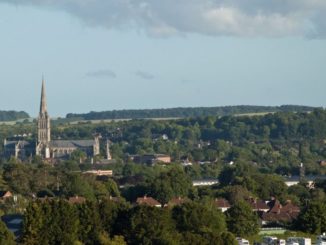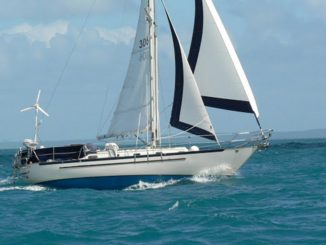COMMENTS ON PART 21 AND YARNS ENSUING FROM THEM
I really enjoyed the comments on part 21 and it seems invidious to single out just a few.
However, I must apologise to both Wattylers wife and Mrs Raft for wrongly attributing to the latter a comment on escapism made about an earlier article by the former. I hope neither was seriously offended by my mistake and anyway suspect both subscribe to the idea its no bad thing to read and think about something different from the propaganda with which we are daily bombarded.
I must also pay tribute to Gordon Brown Prime Minister’s contribution. I’m not sure why he directed his lesson on English Grammar to Bob Crow because I too benefited from it enormously and have printed out a copy. Thats how I know I am using “Present Perfect in Jamaican” when I axe myself whether others have found it useful too. I have only ever used that word combination before when explaining unfortunate accidents.
I’m glad many people picked up my remarks about the shape of the earth. I wanted to keep my own essay quite serious because I was horrified when I heard about other sailors motoring ahead at full speed under autopilot driven by a GPS position displayed on their electronic charts, without knowing whether the chart datum was compatible with WGS 84. I hope Airline Pilots don’t do that, though the consequences would be less important than before, now foreign travel is so restricted.
…………….
Now my remarks have been published again I can repeat a few old jokes mocking people from other countries, as the British sometimes do. Did you know –
“War is God’s way of teaching the Americans geography” – attributed to Ambrose Bierce in the 19th Century.
Wikipedia lists 89 foreign wars since 1800 in which the USA has been a combatant including the one currently ending in defeat in Afghanistan.
I spent Christmas day in 2001 on a US catamaran anchored at St Johns in the US Virgin Islands. I was the guest of a charming couple from one of the northern states in the mid-west . For the purposes of this yarn lets say it was Wisconsin. We were talking about the wider world and what children at school are taught about it.
“In Wisconsin schools our kids are taught about the history and geography of Wisconsin”, said Bonnie, wistfully rather than proudly. Ambrose Bierce’s saying some 100 years earlier was still valid in 2001 and its highly likely it still is in many parts of the country.
“He’d take a world tour but he’s frightened of falling off the edge” – political attack by Democrats on Barry Goldwater during the US presidential election in 1964.
Goldwater lost to Lyndon B Johnson by a landslide but went on to become a highly respected figure in the Republican Party and is credited by its members with having paved the way for Reagan’s presidency.
“More and more of our imports come from overseas” – speech by George W Bush in 2000.
Bush, from an oil-rich family, was specifically speaking about oil imports but that doesn’t make his earnestly-made utterance any less tautological and critics still quote it as evidence of a low intellect.
This expression has a particular resonance for me because I bought a T Shirt displaying the quote in Provincetown, Cape Cod, in September 2001 when it was still fresh in peoples’ minds.
That was after sailing through New York Harbour two weeks before the attack on the 9th September and travelling each day to uptown Manhattan on the subway by boarding trains that stopped at the station under the Twin Towers.
Perhaps I’ll tell you more about the US East Coast in another article – but it may take a long time. At the moment I’m still stuck in Southern Norway because there have been so many interesting distractions along the way.
I found the USA and its people to be a land of almost unbelievable contrasts. Post modern and primitive, deep scholarship and ignorance, unbelievable wealth and poverty, supreme friendliness and hostile arrogance – I don’t know what to make of it all. Perhaps that’s what England is now like too.
“The reason the French make such good round the world sailors is because they don’t know how to anchor” – anon.
A remark about the propensity of some French people in charter yachts to stop their boat over some-one else’s anchor or chain, chuck their own anchor overboard with a very short scope, and not bother to check whether it has dug-in to the seabed before racing ashore to find a bar or restaurant. (The French are not alone in behaving like this and those with experience of the Brittany Coasts’ high tidal ranges, fast currents and rocks are master seamen.)
…………..
I laughed aloud at polar opposite variant’s description of how to find either North or the time (he wasn’t sure which) by pushing a stick in the ground, and his description of the method as a handy way to find “which way is that way”.
Eratosthenes and polar opposite variant are not the only people who have pushed sticks into the ground for astronomical reasons. Here is a photo I took in 2016 of 12 such at the Aire de Pic du Midi on the A64 in France just north of the Pyrenees.
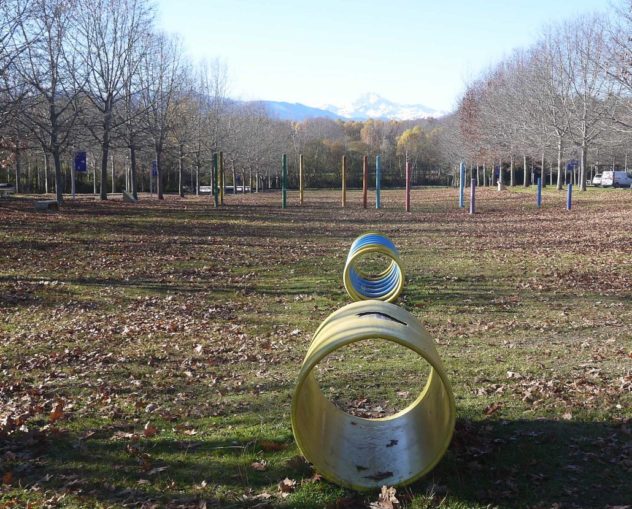
The two items of children’s playground equipment in the foreground form a “line of sight” on the summit of the Pic du Midi seen faintly on the horizon. The sticks are located on an irregular figure of eight in plan view. Each is placed so the tips of the shadows they cast, as seen along the line of sight, are exactly aligned with the mountain’s summit at solar noon on the first day of each calendar month.
Tables on nearby boards explain how to determine solar noon from the shadows on other days and how to correct solar noon to clock time taking into account the time of year and the time difference arising from the longitude of the dial being different from that defining the Time Zone.
Polar opposite variant would be in his element there if he knew where he was going and just wanted to know the astronomical time accurately. Doing it that way might not be quite so handy as his own construction though.
Still, I thought this was a bit of creative landscaping that made the surroundings more interesting than, say, those around South Mimms service station.
If polar opposite variant, or anyone else would be interested in a different Gallic service area he could try the one at Tavel Nord Aire on the A9.
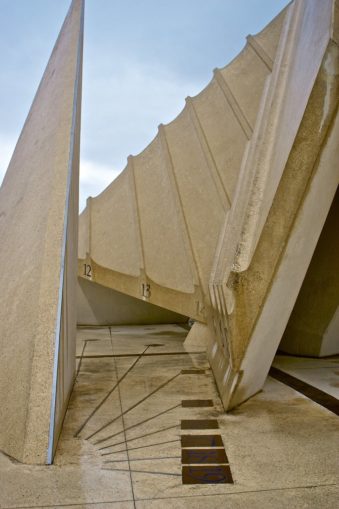
I’ve never been there but this monumental construction is a destination in its own right. It has two gnomons (the bits that cast the shadows), for the morning and afternoon sun respectively, and two sets of hour lines each, one on the ground and one on the inclined surfaces.
The website opened by clicking on the link above takes you to more photos and translations of texts on the plaques around the structure describing how sundial designs evolved. The simple stick in the ground started the process that went through many variants until 1922 when a German mathematician invented one that uses the intersection of two shadows to mark the time. The positions of successive intersections with this type of dial allows the markings to look just like the hour positions on a normal clock. When Cnutador’s car is completed he might like to knock one up by way of relaxation after the rigours of his current project.
The website also contains an essay on Time, The Sun and Clocks, from which any readers who haven’t found enough detail in my own jottings can brush up on the earth’s motion round the sun.
ALCHEMI’S 1997 VOYAGE
I have once again used so much space expanding upon part 21 and the Piratical embedment that follows I shall have to postpone until later the next episode of the Oslo to Bergen leg of Alchemi’s first long voyage.
PIRACY – 4
I have reflected on the best way of continuing these essays within the framework of my own sailing adventures and am reasonably clear I need to conclude them with a summary of piracy and its counter-measures in modern times.
I’m going to approach that objective by considering one part of the world at a time even though that means jumping about from one region to another. I plan to focus mainly on areas I’ve visited myself, or decided to avoid, except for the first region I’ve chosen which is the western end of the Mediterranean.
To start this essay I want to go back to the middle 1400s in the Iberian Peninsula after the Portuguese had evicted the Moors from their lands and dealt with the Pirates from North Africa by designing and building caravels that they later used on voyages of exploration in the early stages of the Age of Discovery.
At this time there were still several Independent Kingdoms in what we now call Spain with Castile and Aragon being the most powerful among them. These Christian Kingdoms had conquered much of El Andalus but the Emir of Granada still ruled in the south.
The marriage of 18 year-old Isabella of Castile to 17 year-old Ferdinand of Aragon in 1469 had profound effects on the world both when they ruled jointly as “The Catholic Monarchs” and subsequently as their descendants became leading members of nearly all Europe’s Royal Families.
They were far less tolerant of other religions than the Arabs had been and passed a decree requiring all non-christians to convert to Catholicism. They also persuaded the Pope to appoint Tomas de Torquemada as Grand Inquisitor with a duty to detect Jews, Muslims and Apostates who were backsliding, and told him to save souls even if it meant sacrificing bodies. (Once the Catholic Hierarchy got going with this programme they extended it when Martin Luther inspired Protestanism, and to indigenous populations in Spain’s new colonies. Even in those days you see, those in power really valued their subjects and created “rules for their own good”).
In the meantime the province of Granada in the south was still ruled by an Emir with whom they soon went to war. It lasted for 10 years until 1492 with victory over the Emir leading to the whole of Spain coming under rule by “The Catholic Monarchs” – incidentally, this was the same year that Isabella sponsored Colombus’s first voyage to the Americas.
Isabella and Ferdinand were still individual monarchs of separate kingdoms and there was much rivalry and suspicion between the two courts that confused the line of succession for some years. Spain became a united kingdom in 1516 when Charles, the son of Isabella and Ferdinand’s daughter Joanna, became King of the entire country. The Joint Monarchs and the Archduke of Austria were allies and they had arranged in 1496 for Joanna to marry Phillip, a young member of the Hapsburg family. Soon after their son became Charles I of Spain he also succeeded his father and a number of other Hapsburgs as Archduke of Austria, Charles V of the Holy Roman Empire, and Sovereign of several other Kingdoms as well. That is how Spain became the Super Power of the era, but that’s another story and not directly connected to Piracy in the Mediterranean – though it was in other parts of the world to be touched upon in later articles.
THE BARBARY STATES
After Isabella and Ferdinand ejected the Moors from Granada the next series of events leading to piracy in a big way was expansion of their boundaries to include territory in North Africa. Ferdinand in particular was keen to add the coastal states of Western North Africa to his possessions that already included Sardinia and Sicily.In the same era, Arab dominance in the Middle East was being displaced by the Ottomans from Turkey. The lands we now call Morocco, Algeria, Tunis and that part of Libya centred on Tripoli were in practice governed by indigenous leaders. Ferdinand succeeded in driving them out of the coastal regions for some way along the coast but he only got as far east as Tunis where he met the Turks coming West after their conquest of Egypt.
The Spanish and the Turks didn’t come into serious conflict with one another and in practice both left day-to-day government to the indigenous inhabitants. Local families became Dynastic Rulers in all four regions that were collectively known in Europe as the Barbary States (from the word Berber which readers will remember was derived from the Graeco-Roman word for Barbarian). Since Spain was Christian and Turkey Islamic the four states became more naturally aligned with Turkey as time passed, whilst effectively remaining independent in secular matters. Of course, in the Islamic world the secular cannot be fully separated from the religious but my impression of these guys was that they were motivated more by material than spiritual considerations.
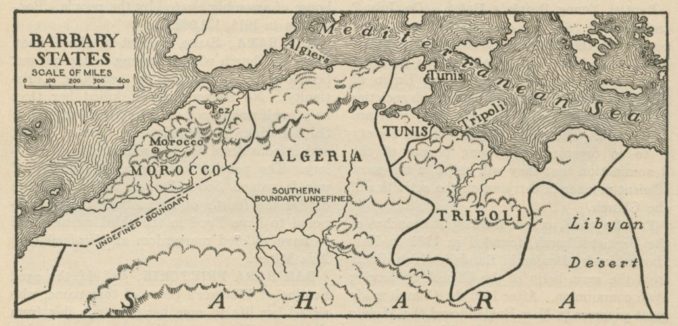
In short order the cities and coasts of the Barbary States became havens for piracy mainly taking the form of capturing Europeans in the north and west, and Slavs in the north east (particularly from around the Black Sea), and either releasing them for ransom or selling them in the slave markets of their own states and the Ottoman Empire. (For etymologically inclined readers I understand there’s no link between the western words slave and slav. The latter is apparently derived from an old word in the slavic language meaning “glory”).
This trade became the main source of income for the local Berbers who were encouraged to expand the practice by the Ottomans both for its direct benefit as a source of slaves and because the Berbers blocked further eastwards expansion by the Spanish and encouraged their complete withdrawal from North Africa. In the west such officially approved Pirates were called Privateers but on the Barbary coast they were known as Corsairs.
That word has since been used in fiction, operas, ballets and the naming of a popular model of motor car. But there was nothing romantic about these real life pirates and the dashing about they did had little resemblance to driving 20th century motor cars made by Ford.
It is estimated that over the next 300 years between 1 and 1 ¼ million Western Europeans were captured from ships and coastal raids and up to 3 million Slavs from the north east Mediterranean and Black Sea coasts, by about 20,000 pirates who had warships and cannon at their disposal.
Coastal regions in Spain, France and Italy were favourite targets but the Corsairs also raided in Holland and around the British Isles, particularly Devon, Cornwall and southern Ireland. It is thought about 3,000 British and Irish were enslaved in this way with some towns like Baltimore having their entire population captured in a single raid. The pirates also seized some notable figures including Miguel Cervantes, the author of Don Quixote, whom they held captive in Algiers for five years until his family and a friendly religious order raised enough cash to pay ransom for his release.
I think this history helps put the capture of the Chandlers and others taken by modern Somali pirates in perspective. One is not surprised at the act itself but shocked that it happened in this day and age.
In the 1640s the British Government obtained release of some 250 English prisoners and slaves by paying ransom before they ran out of cash to pay for more (freedom for females was more costly than that for males). The fledgling US Government also paid the Pirates money to stay away and leave their ships alone. Neither really worked and the trade continued until Britain, France and the US got tough and sent naval and military forces to stop it in the early 19th century.
Readers in the USA may have wondered why the Hymn of the US Marines contains the line “From the halls of Montezuma to the shores of Tripoli”. They may know the music was composed by Offenbach and the words came later from an unidentified lyricist but did they realise the reference is to the first expedition of the US military in the Old World in 1805. During that war Lieutenant O’Bannon and his men raised the Stars and Stripes on the ramparts of Derna after storming the city’s defences. In those days he and his superiors were rather more successful in Libya than Hilary Clinton was when she was Secretary of State in 2011/12.
The British Navy was at the peak of its power at this time after its successes during the Napoleonic Wars and, in 1816, Admiral Edward Pellew, Lord Exmouth, was sent to Algiers to negotiate a Treaty with the Dey (local ruler) that would stop the piracy and enslavement of Christians. A treaty was agreed after stormy negotiations but soon afterwards the Algerians executed 200 Corsican, Sardinian and Sicilian Christians under British protection.
Pellew was sent back and this time took with him a small but powerful fleet that began a bombardment when an Algerian gun was fired. One shot was all it took to provoke the bombardment that continued for eight hours until most of the harbour and all the Algerian fleet had been destroyed. Only 4 or 5 guns could still be seen from the 308 guns and 7 mortars with which the Algerians had started. Over 4,000 slaves were released and £ 80,000 ransom money extracted earlier in the year was recovered.
INVASION OF ALGERIA
The action didn’t stop the slave trade though. The Dey had the harbour and fleet rebuilt using Jewish labour instead of Christian slaves and the trade resumed until 1830 when an invasion resulted in the entire country becoming a French colony.
Many Metropolitan French became colonists in their new territory. They prospered in the early days because the Government granted them special political and economic rights denied to the far more numerous local population.
That didn’t matter to begin with and order was maintained by the civil authorities and the legendary Foreign Legion using scorched-earth practices to overwhelm all resistance. PC Wren incorporated the notorious brutality of the Foreign Legion NCOs into the character of Sergeant Markoff in his story of Beau Geste set in the late nineteenth century.
But the seeds of later conflict were sown when land ownership and agricultural production became re-oriented to favour vineyards owned by the colonists in place of grain and other crops needed by the indigenous population.
Politico-economic conditions in Algeria before WW I have been compared to those in South Africa with the colonists enjoying comfortable and privileged life-styles and the indigenous people living in poverty with negligible political power. That created fertile ground for the growth of Independence movements strongly resented and resisted by the colonists.
ALGERIAN INDEPENDENCE
The demand for better conditions and greater political influence were staved off until after WW II by promises of reform. An effort to fulfill them in a way that might be acceptable to both the colonists and the indigenous population was made by creating an Algerian Assembly in 1947. It was planned that the muslim and non-muslim populations should each be represented by 60 members of the Assembly.
That didn’t please either group. The non-muslims (mostly French colonists) didn’t want their lifestyles threatened and the muslims didn’t look kindly on the fact it would take about 140,000 of their votes to elect a member but only 20,000 to elect a non-muslim member.
The independence movement gathered momentum and became more militant. Fighting broke out in 1954 and continued until 1962. The French army had more than 500,000 soldiers in Algeria by 1956 and were never defeated. Both sides used brutal tactics including physical torture.
The problems gained world-wide publicity when the the issue was raised with the United Nations. The French public became fed up international criticism and with the costs and manpower needed to keep the problem under control. The politicians disagreed about what should be done.
Leading members of the French Army in Algiers organised a coup d’etat and called for the return to power of General de Gaulle (after a 12 year absence from politics) to form a “Government of National Unity” dedicated to preventing the abandonment of Algeria. The Fourth Republic collapsed as a result.
Most politicians supported the coup leaders’ idea but I was amused to read the noted atheist Jean Paul Sartre said “I would rather vote for God. He would at least be more modest than de Gaulle”. De Gaulle did agree to become boss on condition a new Constitution would be introduced giving the president of the 5th Republic more executive power than that provided during the 4th and a seven year term of office with additional extraordinary powers if a State of Emergency was declared.
A new constitution was prepared, approved in a referendum, and all colonies were given the option of joining the new France, or being granted independence with immediate loss of all French financial and other assistance. All except Guinea accepted the new constitution and De Gaulle became President of the 5th Republic in January 1959.
He began this period with an effort to achieve full military dominance in Algeria whilst at the same time reducing the army’s political influence there and improving conditions for the indigenous population. From that position he moved to thinking full integration with Metropolitan France and equal rights for both French colonists and the indigenous population might be a better solution. Finally, he decided the political, social and economic costs of full integration would be too high and agreed to abandon all French claims to sovereign rights over the country and to grant full independence.
The path to that conclusion was bumpy and movement along it was resisted physically with several attempts on De Gaulle’s life and the formation by officers in the Army of a secret society (OAS). They saw De Gaulle’s shifting position as a betrayal of their efforts to put him in power and the OAS mounted a terror campaign in both France and Algeria in an effort to stop independence being granted (ref Forsyth’s novel “The Day of the Jackal” and the film made from it). The campaign was ultimately unsuccessful and its leaders captured and imprisoned. Algeria became a fully independent country in 1962.
The 5th Republic is still extant in France though the 1958 constitution has been subsequently amended many times – as far as I can make out one of the most important changes is a reduction in the president’s term of office to 5 years, but there may be others whose significance I have missed. The powers arising from being Head of Government as well as Head of State, granted to de Gaulle to resolve the Algerian crisis of the 1950’s, are still enjoyed today by President Emmanuel Macron but it sometimes seems he is so unpopular that history may be about to rhyme again. Of course, it may be that modern State controls over the population are sufficient to repress discontent and prevent change – for the time being.
REFLECTIONS
I have again strayed a long way from the piracy with which I started but found preparation of this essay fascinating because –
I have understood the Algerian crisis during my University days much better than I did at the time and can see more clearly than before how it relates to preceding events and to present instabilities in France arising from African immigration into the country.
I have clarified in my mind why the Spanish Central Government response to the independence movement in Catalonia was so severe.
I have concluded Piracy seems to appear just before or just after wars and is often connected with major changes in the way in which countries are governed (these reflections were drafted a week-ten days before the current takeover of Afghanistan by the Taliban that seems to have created ideal circumstances for a new bout of piracy though it may be called terrorism in this context).
In addition I found the activities of the Barbary Pirates truly shocking and the story of Edward Pellew’s bombardment of Algiers a real life account of naval fiction I used to revel in when much younger.
Pellew was a real-life naval officer and one time Captain of a real life frigate called Indefatigable during the Napoleonic wars . He was highly respected and admired by the midshipmen who served on her and was subsequently promoted to Admiral. His success in Algiers was widely acclaimed throughout Europe. Most of the slaves released were Spanish and Italian and the victory was seen more as an achievement on behalf of Christian Europe than one for England alone to celebrate. It strikes me that ennoblement to the House of Lords in those days needed achievement of greater significance than being “Best Frens” with a retiring Prime Minister.
Fans of CS Forester are more likely to remember Pellew as he was described in the Horatio Hornblower stories and portrated by Robert Lindsay in the TV series and film.
I hope readers have found this essay illuminating and do not feel overburdened with historical dust.
ACKNOWLEDGEMENTS AND DISCLAIMER
It is entirely coincidental my essay starts with how the Barbary Pirates came into existence and mentions Edward Pellew less than a week after a review of his Biography was published on Going Postal. Nor did I know about Milton’s book “White Gold”, when writing the current text. I hope you don’t find this effort too repetitive following so soon after Foxoles excellent review of Pellew’s biography and her praise of Milton’s other book.
Likewise, I know there are many books devoted to the Catholic Monarchs, the Hapsburgs, the Algerian struggle for independence, and the history of the French Republics.
I’m sure more authoritative accounts than my own are available on all these matters and present my own interpretation of what happened long ago purely as a brief entertainment and not as a properly authenticated treatise.
To be continued …………….
© Ancient Mariner 2021
The Goodnight Vienna Audio file
Audio Player

